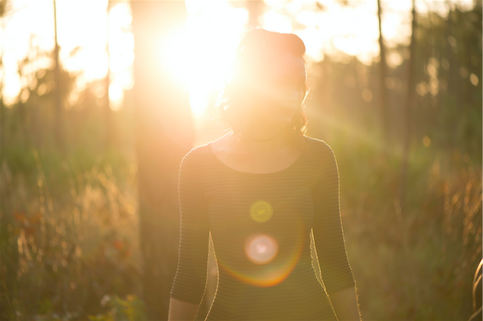and why sunscreen is so vital to skincare
When you’re at the beach—or just stepping out for coffee on your lunch break—the sun’s invisible rays are constantly beating down, even through a cloudy day. Ultraviolet (UV) radiation is what gives us a tan and also damages our DNA, which in worse cases leads to skin cancer.
There are two types of UV rays to be concerned about:
Sunscreens are one of our first—and best—defenses against the sun. Sunscreens are made of different mixes of chemicals. The first type of sunscreen (inorganic chemicals such as zinc oxide or titanium dioxide) physically block sunlight by scattering it away from your skin like an umbrella. Think of the white strips—like paint!--you used to see on people’s noses back in the day. Because these inorganic chemicals deflect sunlight, they deflect both UVA and UVB rays. Now, many manufacturers use smaller inorganic particles mixed with organic, carbon-based lotions that absorb the UV radiation instead of our cells. Organic chemicals, with names such as avobenzone or oxybenzone absorb UVB radiation through their chemical bonds. SPF, which stands for “Sun Protection Factor” is specifically referring to how well the lotion protects against over 90 percent of UVB (not UVA, though some sunscreens claim they provide a broad-spectrum block against both, probably because of the inorganic materials reflecting sunrays away from you). For example, SPF 30 prevents you from burning about 30 times longer than your usual time of burning. So of course, even with the same application of sunscreen, individuals will have varying responses and requirements for protecting their skin. In any case, standard recommendations are to reapply within two hours and wear a hat and sunglasses if you’re out for a long time. Most experts recommend using sunscreen with an SPF between 15 and 50. Surprisingly, SPFs above 50 have not shown to be more effective, so don’t spend the extra money on a higher rating. No matter which SPF you chose, a daily sunscreen is incredibly important for your face, even if you aren’t at the beach. Remember, sunscreen is the single most important thing you can do to help your skin age healthfully and gracefully!
0 Comments
It's so much easier than you think!
It sounds like a gimmick, like the headline to a slew of products promising baby-soft, wrinkle free skin in a "few easy all-natural treatments" that will have you looking completely youthful even at a mature age.
Well, that's just not possible, no matter what anyone claims. But fear not, because it is possible to age gracefully and well, and to retain healthy, glowing skin. Will it be flawless, perfect, wrinkle-free? No, but if you've ever noticed how drastically different one person's skin looks at age 50, 60, 70 compared to a counterpart of the same age, there are definitely healthier-looking versions of aged skin. What's the secret? Of course, your genes and healthy lifestyle (exercise and diet) are a large factor, but there's another factor that's even more important, a major facet that is so simple yet so crucial, is in fact the pinnacle of having healthy skin or not and is arguably even more important than the other components......sun exposure! Starting to wear sunscreen on your face today can help to minimize damage already done--not just at the beach, but every single day. Ultraviolet radiation (UV)--the main energy from the sun that penetrates our skin cells, gives us our tan but also causes damage--comes through even in a cloudy day, even through your car window! Aside from general havoc and free radicals running around, the sun's UV radiation is deadly from a facial care point of view. This is because UV radiation actually penetrates the chromosomes inside cells. Chromosomes are the bundles of genetic material that builds cells and allows cells to replicate, giving you that fresh new layer of skin, as well as replenishing vital tissues throughout your body. But UV radiation starts to break down the ends of these chromosomes, special pieces of genetic code called telomeres that are basically "go" instructions for cells to replicate. Once telomeres get too short, cells essentially hibernate and stop replicating. Once that happens, your skin (or any organ) slows drastically in its ability to replace sluggish or problematic cells, leading to a host of problems. This is such a well-established finding in science that many labs are racing to find out how to lengthen telomeres to improve organ longevity and human health in advanced age. A lot of beauty blogs give out a ton of claims and advice without any actual, real, scientific and substantial basis. There are many rampant and frankly ridiculous claims in the cosmetics world. Given that, an important side note: there are no creams or pills on the market proven to lengthen telomeres! Although a molecule called telomerase is used by cells to elongate their telomeres, any claims that a consumer product can do the same is misleading. If anything, such a product could be a risk for cancer, as unchecked cell growth is a hallmark of cancer, requiring the telomeres to never critically shorten. Back to sunscreen. Wearing sunscreen has its own problems, clogged pores, greasiness, et cetera. That’s why it’s critical to invest in and wear a high-quality sunscreen and use a correspondingly high-quality cleanser to get the sunscreen off at the end of the day. If you do this single step for the majority of your days, you're far, far more likely to have healthier, happier skin than your peers at the same age. For my top recommendations on Korean sunscreens, see this post. And, like the 90s song says, "If you do nothing else, wear sunscreen!" Additional reading
|
About MeI use my background in molecular biology and science to dive into what makes Korean skincare and cosmetic products so effective. Then, I share my findings with you all! infographic |


